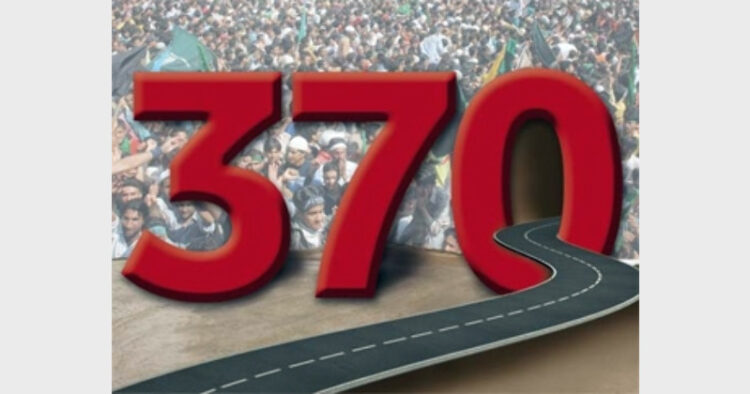Article 370 was positioned as the Part-XXI of Constitution of India after October 1949, debated to be as a ‘Temporary Provision’ for the state of Jammu & Kashmir alongwith Article-369 and Article 371 (Temporary provisions with respect to States in Part B of the First Schedule) to Article-392. The title of Article 371 was changed to Special Provisions w.r.t states of Maharashtra and Gujarat by the Constitution (Seventh Amendment Act 1956) s.22 for Article 371 but the title of the Article 370 was still retained as temporary. Later under Constitution (Thirteenth Amendment Act, 1962) s.2, the title of the Part-XXI of the Constitution of India was changed from “Temporary and Transitional Provisions” to Temporary, Transitional and Special Provisions (w.e.f. 1-12-1963). Even Article 238 and 379-391 were repealed by the Constitution (Seventh Amendment Act, 1956).
Article 370 was temporary with provision for its repeal or retention only with exceptions and modifications (Article 370 Clause-3). Notwithstanding anything in the foregoing provisions of this article, the President may, by public notification, declare that this article shall cease to be operative or shall be operative only with such exceptions and modifications and from date as he may specify. Provided that the recommendation of the Constituent Assembly of the State referred to in clause (2) shall be necessary before the President issues such a notification.
Article-368 was there for amending the Constitution as well as providing the procedure for doing so by Parliament of India but no rationalization of Article 370 was attempted even till 1954, instead more pages were added to it which provided good opportunities to anti-elements for creating controversies over it. Delhi’s silence added more of fuel and hence, since more than six decades, Article 370 of Indian Constitution, inspite of its being a temporary provision, has remained in controversies.
Himalayan Misadventure: VI
More so under circumstances, Article 370 has also been used as a symbolic tool by the separatists and even some so-called mainstream leaders have used it to woo the common people (particularly of Kashmir Valley) for vote-bank game plans. Since the issues raised have not been adequately, and properly addressed to by the Indian leadership (of all parties), the anti elements have surely earned some points.
Article 370 all these years have been wrongly projected even by the mainstream parties of Jammu and Kashmir as a symbol to show that J&K State is distantly placed from other Indian States. More so, the separatists and anti-India elements too used this article for carrying their ideologies to the outside world.
Unfortunately for India the Delhi leaders have not taken the affairs seriously and hence a number of myths have been cultivated in the name of Article 370. Dileep Padgaonkar Team of Interlocutor’s Report (Oct 2011) could be quoted as one of the instances. So strangely Government of India has so far not made any comment on this report publically. The IR suggests for an appointment of a Constitutional Committee that should decide the needed amendments to Constitution of India as well as Constitution of J&K to be considered by the Parliament of India for incorporation under Article 370 (keeping in view the constitutional status as existed before signing of 1952 Delhi Agreement) and even modification of Article 370 where so far experts of the same class were advocating that even Parliament of India with absolute majorities cannot operate upon the text of Article 370.
The way Aricle 370 has been used by people for creating controversies and that it is still not seriously responded by GOI has allowed the ‘experts’ and opinion makers to draw out inferences in the manner they may wish. The contents of the report (2011) of Dileep Padgaonkar lead team of Interlocutors for J&K also reflect how senior media people too have got carried away by the propaganda of some anti-India elements. The IR uses erroneously the term Pakistan Administered J&K for Pakistan Occupied Areas of J&K and simultaneously the report quotes February 22, 1994 Parliament Resolution (that resolves that Pakistan must vacate the areas of the Indian State of Jammu and Kashmir, which they have occupied through aggression). Similarly the Interlocutors for J&K Report 2011 erroneously names the displaced persons from Pakistan Occupied (1947/48) areas of J&K as Migrants where as the official term used for them as per order No: 1476-C of 1950 dated 16.12.1950 issued under the signatures of Sheikh Mohd Abdullah PM of J&K is Displaced Persons. (DPs). And so erroneously the report recommends that POJK DPs (“migrants”) be given the status of State Subjects (Executive Summary-IX page-8 Road Map) where as the POJK DPs are already State Subjects.
Daya Sagar
(The writer is a senior columnist of Kashmir affairs and can be contacted at [email protected]).














Comments